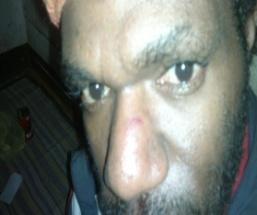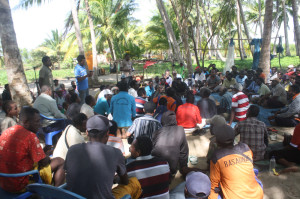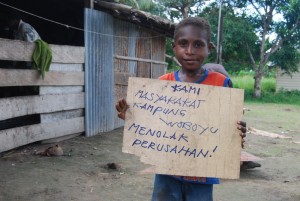INDONESIA: Police officers beat up a journalist in Enarotali, Papua
August 23, 2013
ASIAN HUMAN RIGHTS COMMISSION - URGENT APPEALS PROGRAMME
Urgent Appeal Case: AHRC-UAC-113-2013
23 August 2013
---------------------------------------------------------------------
INDONESIA: Police officers beat up a journalist in Enarotali, Papua
---------------------------------------------------------------------
INDONESIA: Police officers beat up a journalist in Enarotali, Papua
ISSUES: Police violence; threats and intimidation; torture
---------------------------------------------------------------------
---------------------------------------------------------------------
Dear friends,
The Asian Human Rights Commission (AHRC) has received information regarding the torture of a journalist in Enarotali, Papua, by three police officers. The Chief of Paniai District Police has apologised to the victim and promised that he will take action against the three officers. It is likely, however, that the ‘action’ will be administrative and not criminal.
CASE NARRATIVE:
 According to a local activist, on 15 August 2013 at around 4.30 p.m. a journalist for Bintang Papua Andreas Badii was riding his motorbike home after buying a wick for his oil stove when a police officer named Lukman stopped and searched him. When the officer found the wick inside Andreas’s bag, he asked what it was for. In a jokingly but polite manner, Andreas replied: ‘Ah, Uncle, you are just acting like you do not know.’ The police officer, who was a member of Paniai District Police, wast offended with Andreas’s response. He asked Andreas repeatedly: ‘are you opposing me?’ (Picture: Andreas Badii was beaten on his head so that his nose bled heavily. Courtesy of a local activist in Papua)
According to a local activist, on 15 August 2013 at around 4.30 p.m. a journalist for Bintang Papua Andreas Badii was riding his motorbike home after buying a wick for his oil stove when a police officer named Lukman stopped and searched him. When the officer found the wick inside Andreas’s bag, he asked what it was for. In a jokingly but polite manner, Andreas replied: ‘Ah, Uncle, you are just acting like you do not know.’ The police officer, who was a member of Paniai District Police, wast offended with Andreas’s response. He asked Andreas repeatedly: ‘are you opposing me?’ (Picture: Andreas Badii was beaten on his head so that his nose bled heavily. Courtesy of a local activist in Papua)
Andreas explained that he did not mean to oppose the officer and that the threads were only a wick for his oil stove. However, the officer responded by beating Andreas’s head which at that time was covered with a helmet. Two other police officers named Frendi Tomatala and Wellem Usior approached Andreas and also beat him on the face so that the journalist’s nose and lips were injured. One of the police officers pulled Andreas’s shirt from behind making him fall off his motorbike, and Wellem Usior also appointed his gun at Andreas. Andreas’s nose and lips were bleeding heavily but instead of taking him to a hospital for medical treatment, the three police officers took him to East Paniai Sub-District Police Station which is around 500 metres from the scene.
In the police station an unidentified officer explained to Andreas that they had been conducting a security operation since January 2013 and that they were all tired and suffering from lack of sleep. For such reason, the police officers tend to be aggressive. Andreas was later released after being held at the police station for around 30 minutes. Before leaving the station, he looked for the Chief of the Paniai District Police who was unfortunately not around at that time.
The following morning at 8.45 a.m., Andreas was about to go to Paniai District Police to file a complaint about the abuse when the Chief of the district police, Semmy Ronny Aba, called him. The Chief apologised for the bad behaviour of his subordinates and explained that since the Indonesian National Police have a set of code of conduct, a complaint from Andreas can be legally followed up. At 9.15 a.m. Andreas met with the Chief himself who later ordered the officers from the police’s internal monitoring unit to take his complaint.
ADDITIONAL INFORMATION:
In 2009, the Chief of the Indonesian Police issued a regulation which calls for all its members to respect human rights in implementing their roles and duties. According to Article 10 point c of the regulation, for instance, Indonesian police officers are prohibited from using violence, unless it is necessary to prevent a crime or to arrest criminal suspects. Yet despite the astonishing articles under the regulation, violence by police officers remains common as of today. As an example, in early August this year, a police officer shot a mentally ill Papuan to death even though the man did not pose any harm or involve in any criminal activity. Torture has also been reported to be rampant in Indonesia, with police officers marked as state officials who perpetrated the abuse the most.
Although many cases on torture and violence by the police have been reported, only a limited number of them ended in the criminal punishment of the perpetrators. The complaints which did not end up this way were either not followed up at all or were examined by an internal monitoring mechanism within the police, the Professionalism and Security Division. Critics have been addressed to such mechanism not only because it is lacking of transparency but also due to its administrative nature and how it is often used to substitute criminal proceeding. Such substitution is not in accordance with the UN Convention against Torture and other cruel, inhuman or degrading treatment or punishment in which one of provisions requires the adequate punishment of the perpetrators under a criminal proceeding.
SUGGESTED ACTION:
Please write to the relevant authorities listed below asking for their intervention in this case that instead of being given administrative sanction, the three police officers who ill-treated Andreas will be criminally punished. Please also urge them to ensure that adequate reparation is provided to Andreas.
Please write to the relevant authorities listed below asking for their intervention in this case that instead of being given administrative sanction, the three police officers who ill-treated Andreas will be criminally punished. Please also urge them to ensure that adequate reparation is provided to Andreas.
The AHRC is writing separately to the UN Special Rapporteur on Torture and Other Cruel, Inhuman or Degrading Treatment or Punishment, asking for his intervention on this matter.
To support this appeal, please click here:
SAMPLE LETTER:
Dear ...................,
Dear ...................,
INDONESIA: Police officers beat up a journalist in Enarotali, Papua
Name of victim: Andreas Badii
Names of alleged perpetrators: First Police Brigadier (Briptu) Wellem Usior, Second Police Brigadiers (Bripda) Frendi Tomatala and Lukman. The officers are attached to Paniai District Police
Date of incident: 15 August 2013
Place of incident: Enarotali, Papua
Names of alleged perpetrators: First Police Brigadier (Briptu) Wellem Usior, Second Police Brigadiers (Bripda) Frendi Tomatala and Lukman. The officers are attached to Paniai District Police
Date of incident: 15 August 2013
Place of incident: Enarotali, Papua
I am writing to voice my deep concern regarding the torture and ill-treatment against a journalist of Bintang Papua by three police officers from Paniai District Police, Enarotali, Papua. I have been informed by a local activist that in the morning of 15 August 2013, Andreas Badii was riding his motorbike home when Bripda Lukman stopped and searched him. The officer found a wick in Andreas’s bag and inquired on what the journalist will used it for. Responding to such question, Andreas replied jokingly ‘ah, Uncle, you are acting like you do not know’ which was countered rather nastily by the officer. Bripda Lukman asked to Andreas, ‘are you opposing me?’ while the journalist was explaining that what the officer found was just a wick for his oil stove. However, Bripda Lukman hit Andreas on his head while kept asking ‘are you opposing me?’
Two other officers identified as Briptu Wellem Usior as well as Bripda Frendi Tomatala later approached Andreas and started beating him on his head so that Andreas’s nose and lips injured and bleeding heavily. One of the three officers pulled Andreas’s shirt causing him to fall off his motorbike whereas Briptu Wellem Usior appointed his gun at the journalist. Although Andreas was heavily bleeding on his lips and nose, the police officers did not take him to the hospital but to East Paniai Sub-District Police Station which was located around 500 metres away from the scene. Andreas was released on the same day after being held for 30 minutes at the station.
According to the information I have obtained, Andreas received a phone call from the Chief of Paniai District Police, Semmy Ronny Aba, who apologised for the behaviour of his subordinates. Apart from that, the Chief explained that the officers have breached the police’s code of conduct that he will take action against them. The Chief met his promised as after Andreas met him in the afternoon of the same day, the Chief ordered his officers from the internal monitoring unit to take Andreas’s complaint.
I appreciate the fact that the Chief of Paniai District Police has apologised to Andreas directly and also has ordered for the police’s internal monitoring unit (Provost) to follow up Andreas’s complaint. However, I wish to emphasise that this internal mechanism within the police should not be treated as the substitute for the criminal proceeding against the three police officers who have assaulted Andreas. What the officers have done to Andreas was not simply a breach of conduct but – much more serious than that – a crime and a human rights violation.
Bearing this in mind, an effective and impartial investigation on this case should take place that the three officers will be punished criminally in accordance with the law. The ongoing investigation under the Provost shall be continued and conducted transparently, but should not be considered as the substitute for the criminal proceeding. As a state party to the UN Convention against Torture and other cruel, inhuman or degrading treatment and punishment, I am calling you to comply with the obligation to ensure that the perpetrators of torture and ill-treatment are punished adequately and criminally, as required for the convention. In addition to that, I am urging you to ensure that adequate reparation is given to Andreas.
I look forward for your positive, adequate and swift response in this matter.
Yours sincerely,
----------------
PLEASE SEND YOUR LETTERS TO:
PLEASE SEND YOUR LETTERS TO:
1. Mr. Susilo Bambang Yudhoyono
President of the Republic of Indonesia
Jl. Veteran No. 16
Jakarta Pusat
INDONESIA
Tel: +62 21 3458 595
Fax: +62 21 3484 4759
E-mail: webmaster@setneg.go.id
President of the Republic of Indonesia
Jl. Veteran No. 16
Jakarta Pusat
INDONESIA
Tel: +62 21 3458 595
Fax: +62 21 3484 4759
E-mail: webmaster@setneg.go.id
2. Ms. Harkristuti Harkrisnowo
General Director of Human Rights
Ministry of Law and Human Rights
Jl. HR Rasuna Said Kav. 6–7
Kuningan, Jakarta 12940
INDONESIA
Tel: +62 21 525 3006, 525 3889
Fax: +62 21 525 3095
General Director of Human Rights
Ministry of Law and Human Rights
Jl. HR Rasuna Said Kav. 6–7
Kuningan, Jakarta 12940
INDONESIA
Tel: +62 21 525 3006, 525 3889
Fax: +62 21 525 3095
3. Gen. Timur Pradopo
Chief of the Indonesian National Police
Jl. Trunojoyo No. 3
Kebayoran Baru, Jakarta Selatan 12110
INDONESIA
Tel: +62 21 384 8537, 726 0306
Fax: +62 21 7220 669
E-mail: info@polri.go.id
Chief of the Indonesian National Police
Jl. Trunojoyo No. 3
Kebayoran Baru, Jakarta Selatan 12110
INDONESIA
Tel: +62 21 384 8537, 726 0306
Fax: +62 21 7220 669
E-mail: info@polri.go.id
4. Mr. Tito Karnavian
Chief of Papua Regional Police
Jl. Dr. Sam Ratulangi No. 8 Jayapura
INDONESIA
Tel: +62 967 531 014, 533 396
Fax: +62 967 533 763
Chief of Papua Regional Police
Jl. Dr. Sam Ratulangi No. 8 Jayapura
INDONESIA
Tel: +62 967 531 014, 533 396
Fax: +62 967 533 763
5. Ms. Siti Nur Laila
Chairperson of the National Human Rights Commission
Jl. Latuharhary No. 4-B
Jakarta 10310
INDONESIA
Tel: +62 21 392 5227-30
Fax: +62 21 392 5227
E-mail: info@komnas.go.id
Chairperson of the National Human Rights Commission
Jl. Latuharhary No. 4-B
Jakarta 10310
INDONESIA
Tel: +62 21 392 5227-30
Fax: +62 21 392 5227
E-mail: info@komnas.go.id
6. Mr. Abdul Haris Semendawai
Chairperson of Witnesses and Victims Protection Agency
Gedung Proklamasi
Jl. Proklamasi No. 56
Jakarta Pusat 10320
INDONESIA
Tel: +62 21 3190 7021
Fax: +62 21 3192 7881
E-mail: lpsk_ri@lpsk.go.id
Chairperson of Witnesses and Victims Protection Agency
Gedung Proklamasi
Jl. Proklamasi No. 56
Jakarta Pusat 10320
INDONESIA
Tel: +62 21 3190 7021
Fax: +62 21 3192 7881
E-mail: lpsk_ri@lpsk.go.id
Thank you.
Urgent Appeals Programme
Asian Human Rights Commission (ua@ahrc.asia)
Asian Human Rights Commission (ua@ahrc.asia)







